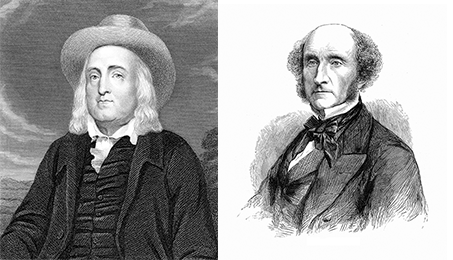3.2 Utilitarianism
Utilitarianism states that the best action in a particular situation is the one that brings most advantages to the most people.
Follow the numbers on the interactive below to get a full definition.
Figure 10 A definition of Utilitarianism
Two of the most important philosophers in the tradition of Utilitarianism are Jeremy Bentham and John Stuart Mill.
The following activity illustrates how the E4J materials seek to support students in transferring their knowledge of ethical principles to different contexts.
Activity 3.2 Case Study - Shipwreck 
This activity is included in E4J Ethics Module 1 on concepts of ethics.
You ask the students to imagine that their ship has started to sink in the middle of the ocean. Eleven people have jumped into a life-boat that only fits ten people, and the life-boat is also starting to sink.
What should the passengers do? Throw one person overboard and save ten lives? Or stick to the principle of “do not kill”, which means that everybody will drown?
You can invite contributions from the class and even take a vote, and then ask students to reflect how different theoretical approaches (e.g. utilitarianism and deontology) will lead to different solutions that are both valid in terms of the particular approach.
What should the passengers do? According to the utilitarian approach, the answer is easy: ten lives saved will produce the most social utility, and therefore – according to utilitarianism – killing one person is the ethical thing to do.
If you would like to read more about the subject, open this article on Utilitarianism [Tip: hold Ctrl and click a link to open it in a new tab. (Hide tip)] by philosopher Charles Freeland.
3.1 Hypothetical scenarios

